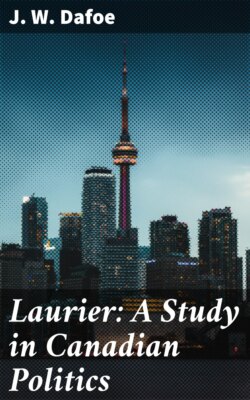Читать книгу Laurier: A Study in Canadian Politics - J. W. Dafoe - Страница 7
LAURIER AND THE RIEL AGITATION
ОглавлениеTop
The “accident” which restored Laurier to public life and opened up for him an extraordinary career was the Riel rebellion of 1885. In the session of 1885, the rebellion being then in progress, he was heard from to some purpose on the subject of the ill treatment of the Saskatchewan half-breeds by the Dominion government. The execution of Riel in the following November changed the whole course of Canadian politics. It pulled the foundations from under the Conservative party by destroying the position of supremacy which it had held for a generation in the most Conservative of provinces and condemned it to a slow decline to the ruin of to-day; and it profoundly affected the Liberal party, giving it a new orientation and producing the leader who was to make it the dominating force in Canadian politics. These things were not realized at the time, but they are clear enough in retrospect. Party policy, party discipline, party philosophy are all determined by the way the constituent elements of the party combine; and the shifting from the Conservative to the Liberal party of the political weight of Quebec, not as the result of any profound change of conviction but under the influence of a powerful racial emotion, was bound to register itself in time in the party outlook and morale. The current of the older tradition ran strong for some time, but within the space of about twenty years the party was pretty thoroughly transformed. The Liberal party of to-day with its complete dependence upon the solid support it gets in Quebec is the ultimate result of the forces which came into play as the result of the hanging of Riel.
After the lapse of so many years there is no need for lack of candor in discussing the events of 1885. To put it plainly Riel's fate turned almost entirely upon political considerations. Which was the less dangerous course,—to reprieve him or let him hang? The issue was canvassed back and forth by the distracted ministry up to the day before that fixed for the execution when a decision was reached to let the law take its course. The feeling in Quebec in support of the commutation was so intense and overwhelming that it was accepted as a matter of course that Riel would be reprieved; and the news of the contrary decision was to them, as Professor Skelton says, “unbelievable.” The actual announcement of the hanging was a match to a powder magazine. That night there were mobs on the streets of Montreal and Sir John Macdonald was burned in effigy in Dominion square. On the following Sunday forty thousand people swarmed around the hustings on Champ de Mars and heard the government denounced in every conceivable term of verbal violence by speakers of every tinge of political belief. This outpouring of a common indignation with its obliteration of all the usual lines of demarcation was the result of the “wounding of the national self-esteem” by the flouting of the demand for leniency, as it was put by La Minerve. Mercier put it still more strongly when he declared that “the murder of Riel was a declaration of war upon French Canadian influence in Confederation.” A binding cement for this union of elements ordinarily at war was sought for in the creation of the “parti national” which a year later captured the provincial Conservative citadel at Quebec and turned it over to Honore Mercier.
This violent racial movement raged unchecked in the provincial arena, but in the federal field it was held in leash by Laurier. That he saw the possibilities of the situation is not to be doubted. He took part in the demonstration on Champ de Mars and in his speech 'made a declaration—“Had I been born on the banks of the Saskatchewan I myself would have shouldered a musket”—which riveted nation-wide attention upon him. Laurier followed this by his impassioned apology for the half-breeds and their leader in the House of Commons, of which deliverance Thomas White, of the assailed ministry, justly said: “It was the finest parliamentary speech ever pronounced in the parliament of Canada since Confederation.” In the debate on the execution of Riel all the orators of parliament took part. It was the occasion for one of Blake's greatest efforts. Sir John Thompson, in his reply to Blake, revealed himself to parliament and the country as one worthy of crossing swords with the great Liberal tribune. But they and all the other “big guns” of the Commons were thrown into complete eclipse by Laurier's performance. It is easy to recall after the lapse of thirty-six years the extraordinary impression which that speech made upon the great audience which heard it—a crowded House of Commons and the public galleries packed to the roof.
In the early winter of 1886-7 Laurier went boldly into Ontario where, addressing great audiences in Toronto, London and other points, he defended his position and preferred his indictment against the government. This was Laurier's first introduction to Ontario, under circumstances which, while actually threatening, were in reality auspicious. It was at once an exhibition of moral and physical courage and a manifestation of Laurier's remarkable qualities as a public speaker. Within a few months Laurier passed from the comparative obscurity to which he had condemned himself by his apparent indifference to politics to a position in public life where he divided public attention and interest with Edward Blake and Sir John Macdonald. When a few months later Blake, in a rare fit of the sulks, retired to his tent, refusing to play any longer with people who did not appreciate his abilities, Laurier succeeded to the leadership—apparently upon the nomination of Blake, actually at the imperious call of those inescapable forces and interests which men call Destiny.
